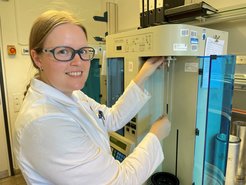Minerva’s daughters are treading new paths
Sabrina Brunner is one of the institute’s apprentices
Sabrina Brunner and chemistry - it was a perfect match. But which is the right path to her dream job? In this interview, the young woman explains how she ended up at the Max Planck Institut für Kohlenforschung and why she enjoys her job in the laboratory so much.

Sabrina Brunner works as an apprentice at the institute. The young woman from the Lower Rhine region has been interested in chemistry since the eighth grade. However, for a long time, she would never have imagined that she would one day end up at the MPI für Kohlenforschung.
What brought you here? Tell us about your way to the Kohlenforschung!
Sabrina Brunner: It was clear to me quite early on that chemistry was the right direction for me. I cannot even say how it came about - I just liked chemistry. As both my parents studied, it was obvious to me that I should start studying chemistry. However, I quickly realized that I liked the practical work in the lab much more than the theoretical work in the office. I also spent a lot of time caring for my grandmother and later for my mother. When the care work became less time-consuming, I had to make a choice: do I continue to struggle through my studies or do I drop out and start an apprenticeship? I decided to do an apprenticeship - and luckily came across the job advertisement at the MPI. An apprenticeship at a basic research institute really appealed to me - and I was delighted to be accepted.
What do you like about your work?
Sabrina: I simply enjoy practical work. I find the work in the lab very interesting and rewarding. If I work neatly and methodically, I am rewarded with a good result. Moreover, even if something does not work, the work is fun. Then we just have to think about what we can change and try again. I also really, really like the working atmosphere here at the institute.
What are your career goals?
Sabrina: In addition to my training as a chemical laboratory technician, I will also start a technician course at night school soon. This offers additional career opportunities. My dream would be to be able to stay here at the institute after my training.
What has been your most difficult step so far?
Sabrina: The decision to drop out of university was not an easy one. Yes, I struggled a bit, but I had invested a lot of time in this path - only to stop it now. That was quite a leap. Nevertheless, it was not time wasted, of course. What I learned during my studies helps me enormously in my training today.
Do you have a role model?
Sabrina: I do not really have a classic role model. Nevertheless, when I think of women in science, I automatically think of Marie Curie and Rosalind Franklin. These two women achieved amazing things for science around 100 years ago. They clearly proved that women have a place in science!
What advice would you give to young girls who are interested in working in a scientific institution?
Sabrina: I think that every young woman should look for a career that interests her. After all, our working lives will make up more than half of our lives. Therefore, if you are interested in science, you should give it a try. However, you shouldn't bury your head in the sand if you realize at some point that you've taken the wrong path. Then it is time to try out a new path.
If you had one wish: What would it be?
Sabrina: I would like people to take climate change seriously. The scientific data has been clear for years. We notice it ourselves in the increasingly extreme weather. Yet nobody is really doing anything to stop climate change.












